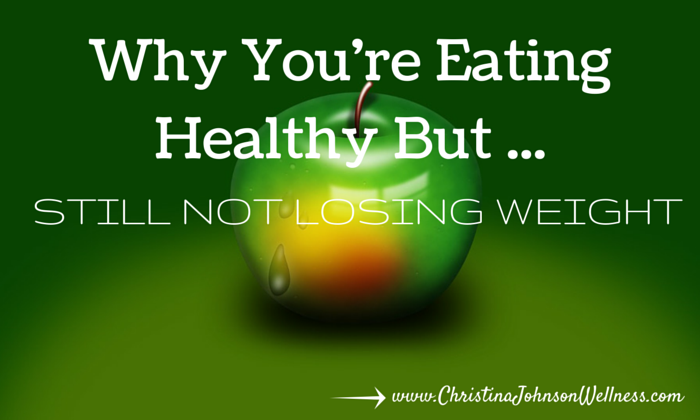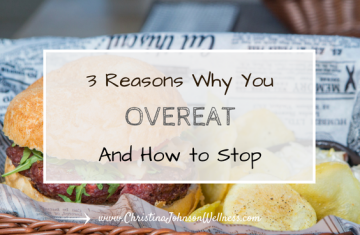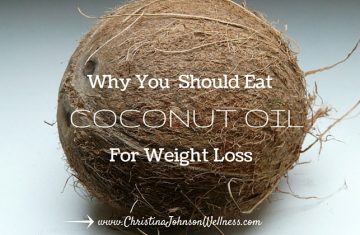Are you frustrated because you feel like you are doing all of the “right” things to lose weight, but it’s just not working? Or maybe you lose a few pounds only to gain them back later?
For some people, losing weight and feeling healthy is pretty effortless…but then there’s the rest of us who feel like weight loss is a constant, never ending battle.
To be honest with you, even though I eat really healthy the majority of the time, maintaining a consistent weight can still be a challenge for me. As a result, I’ve spent hours trying to figure out what might be preventing my body from keeping the weight off effortlessly.
Through my search I have found some interesting answers. My hope is that by sharing them here they will be helpful for you, too!
You think you’re eating healthy…but are you really?
For many years I thought that I was eating healthy and doing everything right, but what I was doing just wasn’t working. I followed all of the conventional wisdom about eating low-fat foods, I counted calories, and I ate diet food products. But even when I was able to lose weight, it always seemed to come back on.
The first real answer I found was to throw conventional wisdom out the window! And along with it went all of my low-fat and diet foods. What entered in their place was an entirely new way of eating and looking at food. I simply began to eat real food. The foods that I started to use to nourish my body were ones that are minimally processed and in their whole, natural form.
And while exercise and other lifestyle factors play a role in health and weight loss, starting with a healthy diet of real foods is truly the foundation for achieving a healthy weight.
So if you are struggling to lose weight (and not already doing so), start by eating real food. If you’d like to know exactly which foods to eat and which foods to avoid, click here to download my Eat REAL Food graphic.
What if You’re Eating REAL Food But STILL Not Losing Weight?
Unfortunately, for a few people (myself included), switching to a real food diet does not immediately solve all of the issues. A variety of factors may be causing imbalances in our bodies that also need to be addressed in order for our bodies to finally reach a healthy weight.
Here are some questions to ask yourself to determine if another factor is affecting your weight loss efforts:
Do you have a food sensitivity?
We’re all familiar with allergic reactions to food, many of which can be life threatening. What many people don’t realize, though, is that we can be sensitive to foods that cause harm to our bodies without actually having a severe allergic reaction to them.
Therefore, many of us are sensitive to foods, but don’t realize it. Some of the common food sensitivities are: gluten, dairy, corn, soy, eggs, peanuts, and sugar.
These food sensitivities can set off a chain reaction of negative events in our bodies: the food sensitivity damages our gut, which causes toxins and undigested food to leak into our blood stream, which triggers inflammation throughout our body, which leads to health issues like weight gain [1].
The good news is that many people are able to lose weight once they identify their food sensitivities and then eliminate them from their diet.
Are your hormones out of balance?
Too much estrogen, insulin resistance, or an excess of cortisol (the stress hormone) can wreak havoc on our bodies and prevent us from losing weight [2]. Having balanced hormones is a key to a healthy weight. Working with a skilled practitioner to balance these hormones may be beneficial for some people who struggle with their weight.
Are you getting enough sleep?
I have always known that sleep was important, but I haven’t always really understood the impact that it actually has on my health and on my weight.
First of all, when we are sleep deprived, we simply tend to make food choices that aren’t the best for us. Think about it…the last time you were feeling tired, what did you do? Were you tempted to grab some caffeine or sugar to keep you going?
Also, studies have actually proven that when we don’t get enough sleep, our bodies produce more of the hunger hormone ghrelin, we consume more calories overall, and our metabolism stops functioning properly. That doesn’t sound like a good combination at all!
On the other hand, adequate sleep can actually boost fat loss. So, if you are concerned about weight loss resistance, try making it a priority to get 7-9 hours of quality sleep every night. It just might be the change your body needs!
How effective are your workouts?
I’ll start with the obvious…if you’re not active in some way, start moving! Walking, sprinting, practicing yoga, playing outside with your kids, whatever it is, we need to move! In our society, it’s way too easy to sit at a desk all day and then sit around the house all evening. Breaking this cycle is a must for optimal health.
For those of you who are already working out, but aren’t seeing the results you’d like, it’s time to take a look at the types of workouts you are doing.
Surprisingly, chronic cardio may actually be putting extra stress on your body. In fact, it’s been shown to decrease fat metabolism and disrupt cortisol levels…neither of which we want if we’re looking to lose weight [3]!
So instead of focusing on chronic cardio, you might want to look into High Intensity Interval Training (HIIT) instead. HIIT has been proven to be more effective at achieving weight loss than cardio alone. With HIIT you actually burn more fat than you do during cardio and you continue burning fat for up to 48 hours after working out [4]. Which means you can actually see more results in less time. Who doesn’t want that?!?
Do you need to address any emotional issues?
It’s not often talked about, but emotional issues also contribute to weight loss resistance. We eat to fill loneliness, to make us happy, to deal with stress, because we don’t feel worthy, to reward ourselves, to be in control… If we don’t address these underlying issues, we will always struggle with our weight.
Mindful eating (a topic I will explore more in a future post) can be an excellent tool to help address this area.
So now what?
If you’re not losing weight, the best place to start is by examining what you eat and making the switch to eating real food. For most people, eating real food will allow them to maintain an ideal weight.
If, however, you are one whose body doesn’t respond solely to these dietary changes, then start asking yourself the questions from this article to provide yourself with some clues as to what may be hindering your progress. Working with a skilled practitioner may be necessary to address some of these issues, especially hormone balancing.
Either way, please know there is hope, and change is most definitely possible!
I’d love to hear from you…which of these weight loss obstacles resonates with you the most? Please share in the comments below.
And, as always, if you would like more personalized support, guidance, and encouragement, feel free to apply for a complimentary “Lose Weight & Keep It Off” Discovery Session. I would be happy to do a complimentary 30 minute coaching session with you to help inspire you to start taking actions toward your goals!
Sources
[1] Hyman, Mark. (2014, October 18.) How Hidden Food Sensitivities Make You Fat. Retrieved from http://drhyman.com/blog/2012/02/22/how-hidden-food-sensitivities-make-you-fat/
[2] Gottfried, Sara. (n.d.) Three Hormones that Block Your Weight Loss. Retrieved from http://www.saragottfriedmd.com/three-hormones-that-block-your-weight-loss/
[3] Kresser, Chris. (n.d.) Beyond Paleo #8 [Blog post]. Retrieved from https://chriskresser.com/beyond-paleo-8/
[4] Axe, Josh. (n.d.) Burst Training Studies Prove Fast Weight Loss. Retrieved from http://draxe.com/whats-the-1-exercise-to-burn-belly-fat-fast/



